Looking to transform your car’s appearance without the hassle of a full paint job? Vinyl wraps offer an easy and cost-effective way to change your vehicle’s look! In this guide, we’ll introduce the types of vinyl wraps, their key benefits, and helpful tips to choose the right wrap you desire. Ready to explore the world of car wraps? Let’s dive in!
What Is Vinyl Wrapping for Cars?
Vinyl wrapping is applying thin adhesive vinyl films to a car’s exterior. It allows you to cover your car in different colors, finishes, and customized patterns without damaging the underlying paint. Seeking help from a professional is a great idea especially if you are new to applying wraps. However, you can also apply them yourself as this process is relatively simpler compared to a paint job.
Difference Between Wrapping and Repainting
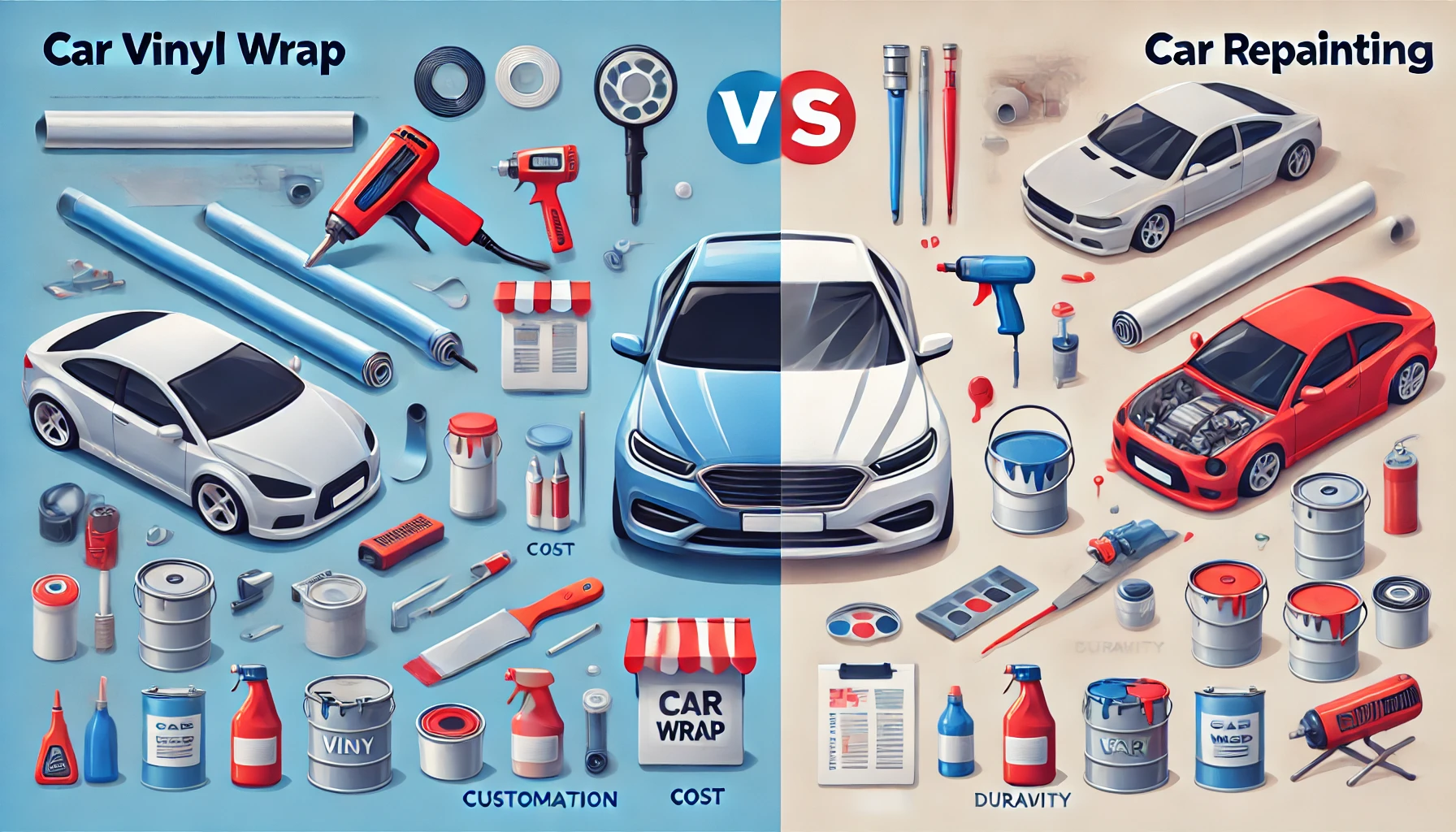
Car repaints have been in practice long before wraps were introduced. Both options change the appearance of your vehicle by giving it a new color and protecting it from damage. However, a vinyl wrap costs less than a traditional paint job and can be put on any car with different finish combinations. We have concluded their differences in the given table.
| Vinyl Wraps | Repaints | |
|---|---|---|
| Customization Options | Car wraps come in various patterns, colors, and finishes. | Some patterns are hard to paint. So, usually, car paints only change the color and finish of a car. |
| Time for Installation | You can apply a vinyl wrap in 7 to 9 hours. Some larger vehicles may take more time. | Repainting your car can take 40-80 hours or longer depending on the preparation and the time for drying. |
| Required Expertise | We recommend seeking expert help but car wrapping could be a DIY solution if you do it carefully. | Car repaints require professional expertise. |
| Cost | A cost-effective solution as you can perform it yourself. | A premium repaint solution costs much more than wrapping depending on the number of coats needed and the car's condition. |
| Durability | A vinyl wrap can last for 3 to 7 years. | Car paint can last for decades if you take proper care. |
| Reversibility | You can easily take off a car wrap as this is a temporary solution. | Car paint is a permanent solution, and reversing the color requires repainting your vehicle. |
| Required Equipment | Requires simpler equipment, such as a heat gun, a measuring tape, and a cutter. | Requires specialized equipment like spray guns, primers, powdered sander, acrylic topcoats, etc. |
Benefits of Vinyl Wraps
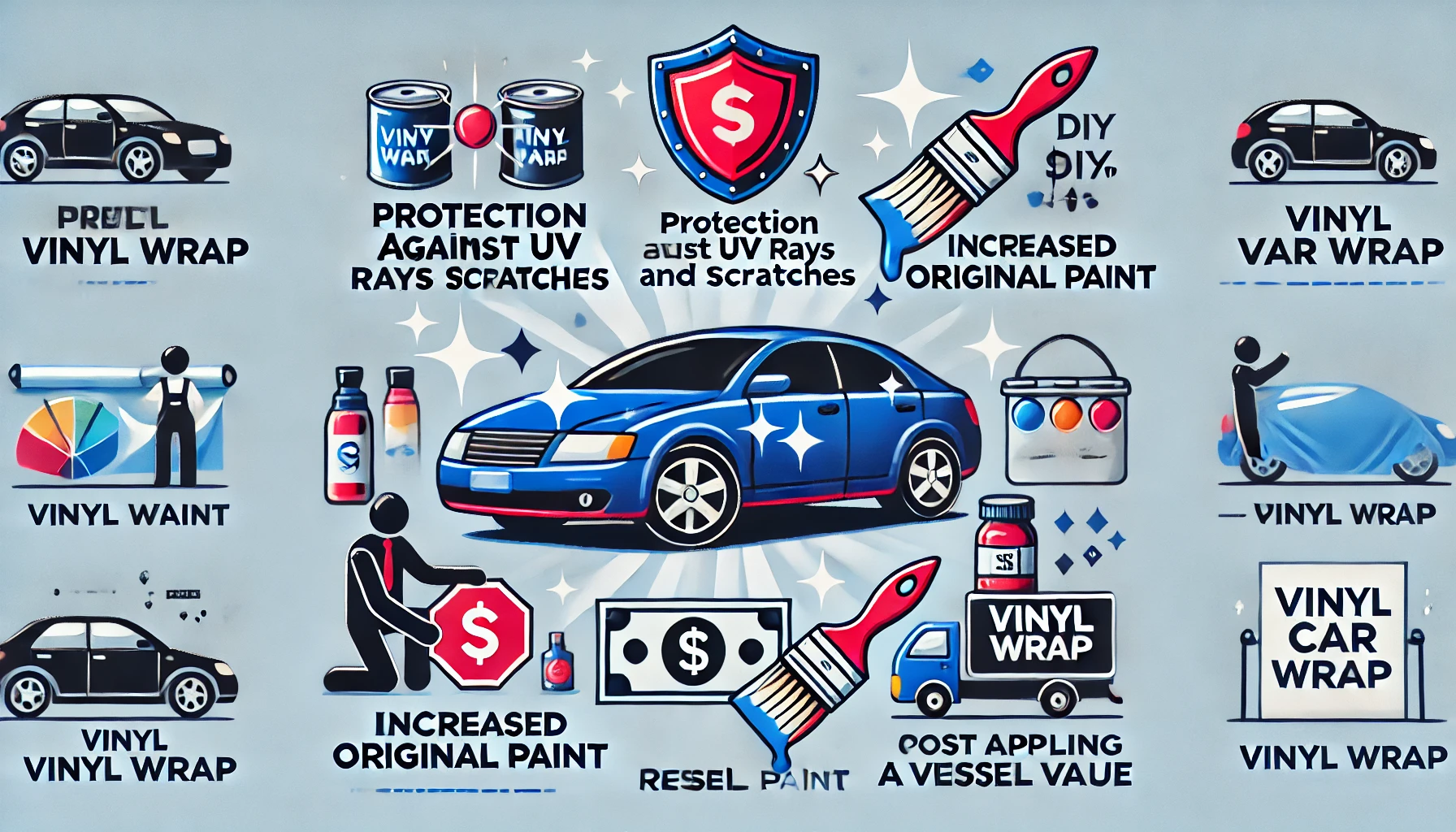
Vinyl wraps do not only improve the aesthetics of your car but they offer the following benefits as well:
Provide Protection
Vinyl wraps protect your car from the damages of UV rays, chemicals, scratches, harsh weather conditions, and bird droppings. PVC polymer is known for its strength and chemical-resistant properties.
Retain Original Paint
You can apply car wraps without worrying about what if you don’t like the new look and would want to revert it to the original form. Vinyl wraps are easier to remove and they don’t damage the underlying paint of the car.
Increase Resale Value
Even minor cosmetic damage can reduce vehicle resale value. The impact on your car’s market sale price ultimately depends on the severity of the damage. So, it is necessary to protect your car’s exterior and give it an upgraded look to increase its resale value.
Cost-Effective Customization

If you get bored with seeing the same vehicle and want to change its appearance style, it is really cost-effective to use partial vinyl wraps to personalize your car the way you want.
Easier Application
Wrapping your car could be a DIY solution if you don’t prefer reaching out to an expert and we will be discussing it in detail in the coming section. Applying a vinyl wrap is easier as they do not require technical expertise, specialized equipment, and a lot of time.
Serve Personal and Business Purposes
Vinyl wrapping is gaining popularity among consumers, so it can be a profitable business idea. You can use these wraps for both personal use and from a business perspective. The car wrapping industry has associated opportunities, such as advertising or branding. For example, it is common to see food trucks wrapped for brand promotions. All you would need is an understanding of various types of wraps, trusted brands, and the installation process.
Types of Vinyl Wraps
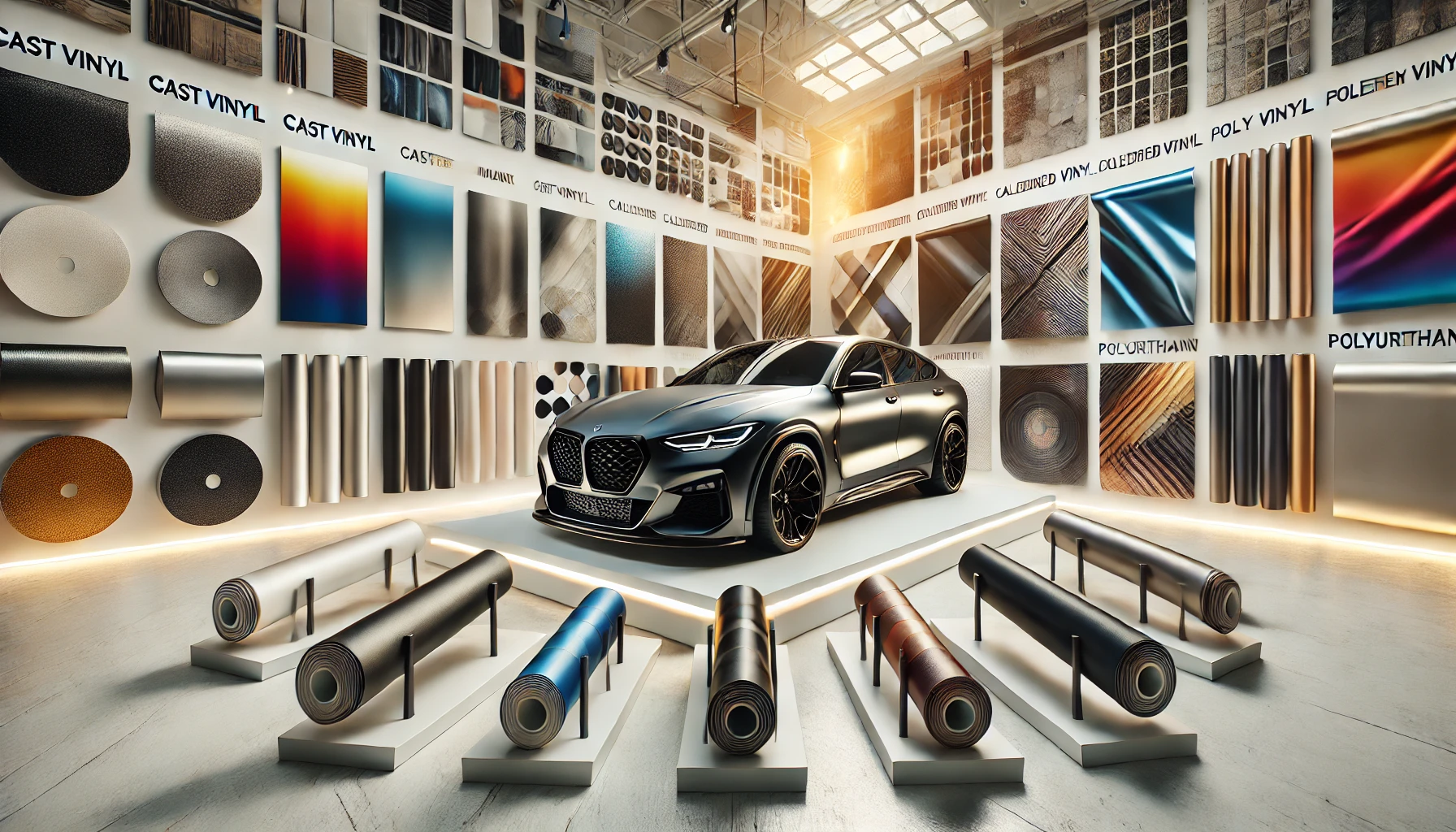
Following are the types of vinyl wraps based on the materials and finishes:
Vinyl Wrap Materials
Car wraps are found in the form of cast films, calendered vinyl, and polyurethane wraps. Let’s explore these materials one by one.
- Cast Vinyl: It is an industry premium polymer having a wide range of applications. Cast films are durable, making them resistant to cracks, harsh weather, and ultraviolet rays. These sheets are thin and flexible, so they are easier to apply to car curves without wrinkling. They can have a textured and glossy look on one side and the other side has the adhesive material. This material retains color and shrinks less over a period of time.
- Calendered vinyl: This material costs less than cast vinyl and is available in a number of different colors, making it a budget-friendly option for car customization. Calendered films are thicker and less flexible than cast vinyl, so they are ideal for flat surfaces and provide resistance against abrasion. This polymer shrinks over time but it still lasts for 3 to 6 years.

- Polyurethane Wraps: Also known as Paint Protection Film (PPF), these wraps are an alternative to vinyl films. They are durable and last for up to 10 years. These films are thicker than vinyl wraps, making them abrasion-resistant. The UV-protection properties of PPFs make them ideal for wrapping your car. These sheets offer a balance between affordability and quality. Polyurethane films provide good color saturation and various types of finishes, such as gloss, satin, or matte. So, you can choose clear PPF or color PPF.
Vinyl Wrap Finishes
We have mentioned different types of finishes above, let’s explore the types of wraps based on the finish:
- Glossy Car Wrap: These wraps have reflective surfaces and give a lustrous and sheen touch to a car. A high-gloss finish is great for giving your car an eye-catching appearance. These films are great for sports car enthusiasts.
- Matte Car Wrap:
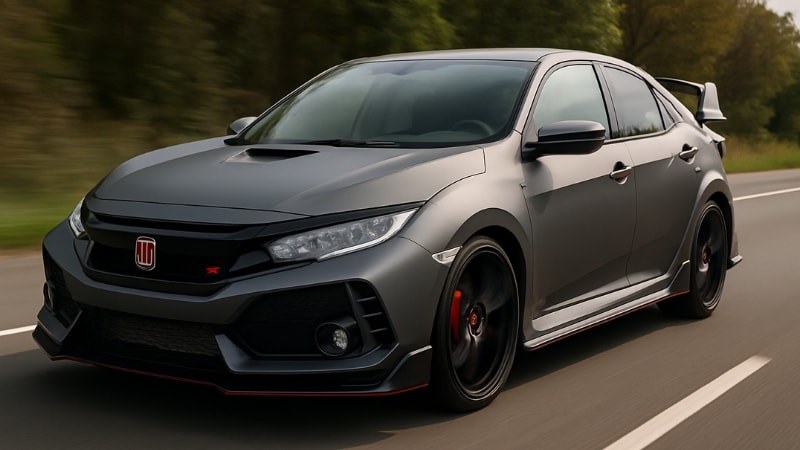
- They give a non-reflective, flat finish to a car, giving it a premium appearance. Black matte wrap is a recommended one, which is not glossy at all, thus exuding a sense of elegance. If you are interested in black matte wrap, it is suggested to learn about its costs in consideration.
- Satin Car wrap: These wraps offer a balance between a glossy finish and a matte look. They are neither too dull nor too shiny. If you want some shine on your car, you’d better know the differences between satin car wrap and glossy ones to choose the right wrap. The moderate shimmer is ideal for those who want a versatile, sophisticated appearance.
Best Budget Vinyl Wraps
When it comes to choosing the best budget vinyl wrap for cars, we have the following list of reliable brands that produce durable films:
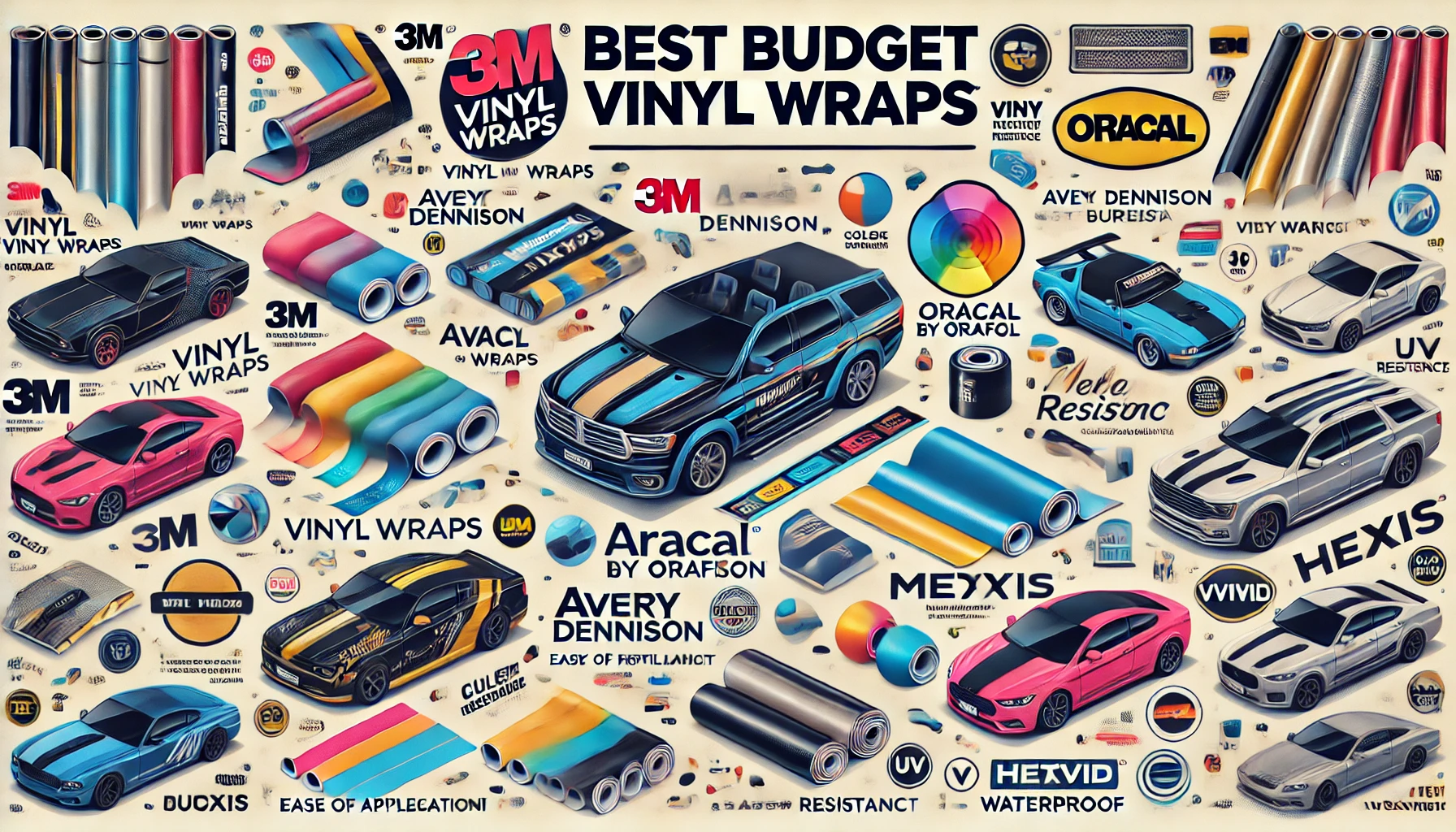
CARLIKE ®
- Carlike‘s vinyl wraps have high durability. Last for up to 5 years.
- Easy to install due to its Super Stretch technology. Made with high polymeric PVC film, these wraps are stretchable, making them easier to apply on the curves of a car’s exterior.
- Easy to smooth out wrinkles by heating them.
- Does not damage the original paint during removal. The adhesive side of these films has solvent-based acrylic adhesive with honeycomb air channels that leave no residue when you remove them.

- Excellent UV resistance
- Waterproof
- Available in over 20 series, offering more than 200 colors and multiple finishes (metallic, gloss, satin, matte, carbon fiber)
- Low to medium cost.
3M Vinyl Wraps
- One of the oldest car wrapping brand
- High durability, resistant to cracking with a long lifespan (5-7 years)
- Excellent ease of application with air release channels. Technologies like the Comply™ Cv3 air release system allow for easy, fast, and bubble-free installation. However, applying 3M wraps can be difficult for newbies and they require professional installation.
- Excellent UV resistance

- Waterproof
- Available in over 100 colors and multiple finishes (gloss, matte, satin, metallic, carbon fiber)
- Comparatively higher cost.
Avery Dennison
- 4.4 mil in thickness
- High durability
- This technology allows for wrinkle-free application with no trapped bubbles.
- Excellent UV resistance
- Waterproof
- Available in over 120 colors.
- Various finishes (gloss, matte, satin, metallic, pearlescent)
- High-end cost

Oracal (by Orafol)
- 4.25 mil thickness
- High durability and good performance life. Last for up to 7 years.
- RapidAir® air-release technology allows for faster, quicker, and bubble-free installation.
- Excellent UV resistance
- Waterproof
- Available in 80 colors with multiple finishes like gloss, matte, and metallic
- Medium cost
HEXIS
- Varies in thickness (3.94 to 4.33mil) and durability, are generally good.
- Good ease of application, some lines have air release channels with HEX’PRESS adhesive.
- Excellent UV resistance
- Waterproof
- Extensive color range with unique finishes like chameleon and chrome
- Medium cost

Metamark
- Varies in thickness (around 3.15 mil) and durability, and lasts for up to 7 years.
- Varies in ease of application, some types come with air-release channels
- Limited range of colors compared to other brands. Available in multiple finishes (gloss, matte, satin)
- Low to medium cost.
VViViD
- Vary in thickness (3.4- 5.5 mils). Last for up to 5 years. Some varieties, such as carbon fiber are not so durable compared to the wraps from other brands.
- Some types are slow to adhere. Feature bubble-release technology.
- Resistant to UV rays and color fading
- Resists minor scratches and imperfections.
- Low-end cost
Choosing the Right Vinyl Wrap for Your Vehicle
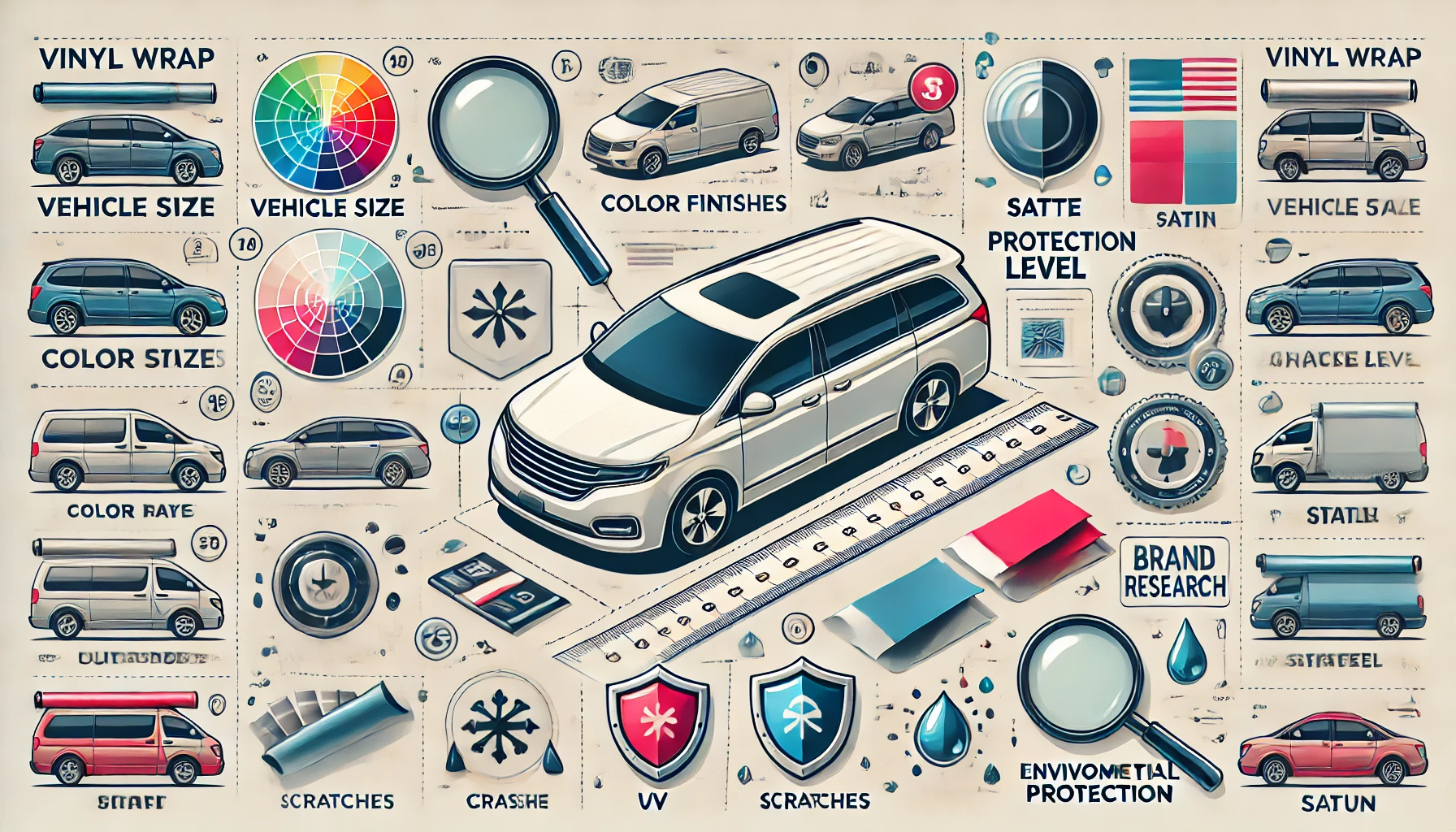
Consider the following factors while choosing the right vinyl wraps for your car to make an informed decision:
Size and Design of Your Vehicle
The size of your vehicle will determine the size of the wrap you’d need, so plan the budget accordingly. If you are planning to wrap your vehicle yourself, you will need to get an idea of how much vinyl you need. The recommended sizes vary based on the models of the vehicles. You can also try partial wraps, but here are some general measurements of different types of vehicles:
- Van: 25 yards
- SUV and 4WD: 19-24 yards
- Sedan: 18-20 yards
- Hatchback: 19-22 yards
- Sports car: 18-20 yards
- Micro: 9 yards

Similarly, consider the complexity of the design of your car while picking a vinyl film. For example, if your car has more curves, you would need a more flexible wrap.
Desired Finish and Color
Decide the color or patterns you would want to go for. Try to get a photoshopped picture of your car to visualize how it would turn out to be. This will help you become more confident about your decision.
Apart from improving the aesthetic appeal of your car, there are some practical aspects to consider while choosing the finish type. For example, a gloss film’s look gives a charming luster to the car and makes the cleaning easier but scratches on the surface become more visible.
A matte look is great for hiding scratches and minor dents, but it requires extra maintenance as it holds the dust particles more than a gloss finish. On the other hand, a satin look is an ideal solution if you do not prefer entirely matte or glassy finishes.
Level of Protection

Consider the condition of your vehicle before choosing a vinyl vehicle wrap. If your has scratches, minor dents, or a damaged surface, go for high-end brands that not only hide those imperfections but offer protection from environmental elements.
However, if you only want customization, you can go for any reliable brand. In either case, make sure to pick a wrap that provides protection against color fading, UV rays, humidity, and harsh weather conditions.
Brand Research
Do your research on brands and the quality of their wraps. Consider various factors, such as the level of protection they provide, check out the cost comparisons, and consider their ease of application before picking a brand.
Vinyl Wrap Cost and Installation
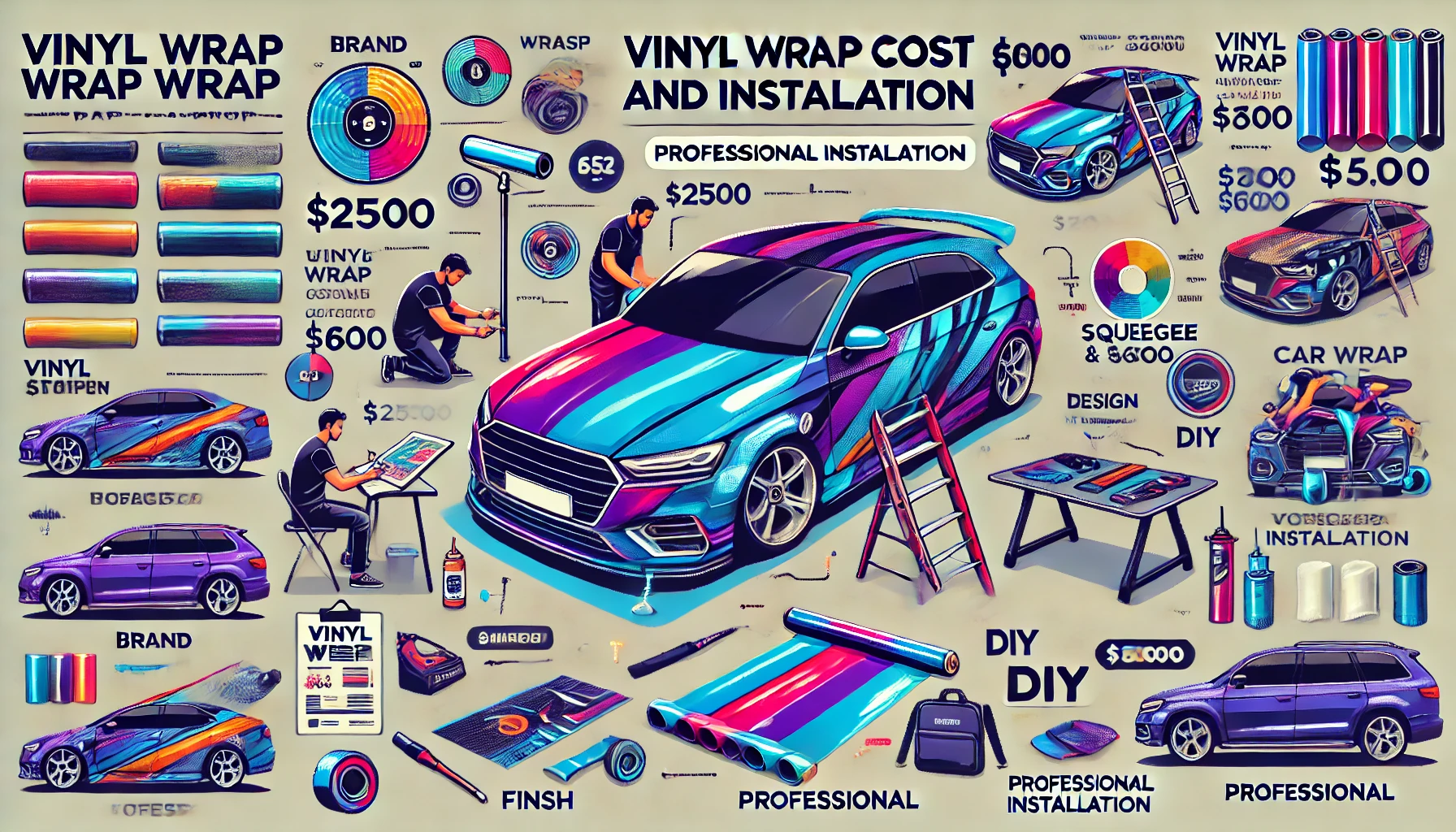
It is important to have an idea about the budget for a car wrap. The cost of wrapping a car depends on the brand providing the vinyl wrap, the type of finish and film, the size of your vehicle, and its design complexity.
Custom vinyl wraps could cost higher based on the design you prefer. The condition of a vehicle also determines the cost. So, you should evaluate the conditions of your cars, as rough conditions require a complex preparation procedure.
Professional vinyl and partial wrap installation can range from $2500 to $6000. The cost depends on the level of expertise and reputation of the installer. You can opt for DIY installation as well which we will be discussing in the next sections. Installing a car wrap needs the necessary skills, care, and experience to achieve flawless results.
Customization Options for Car Owners
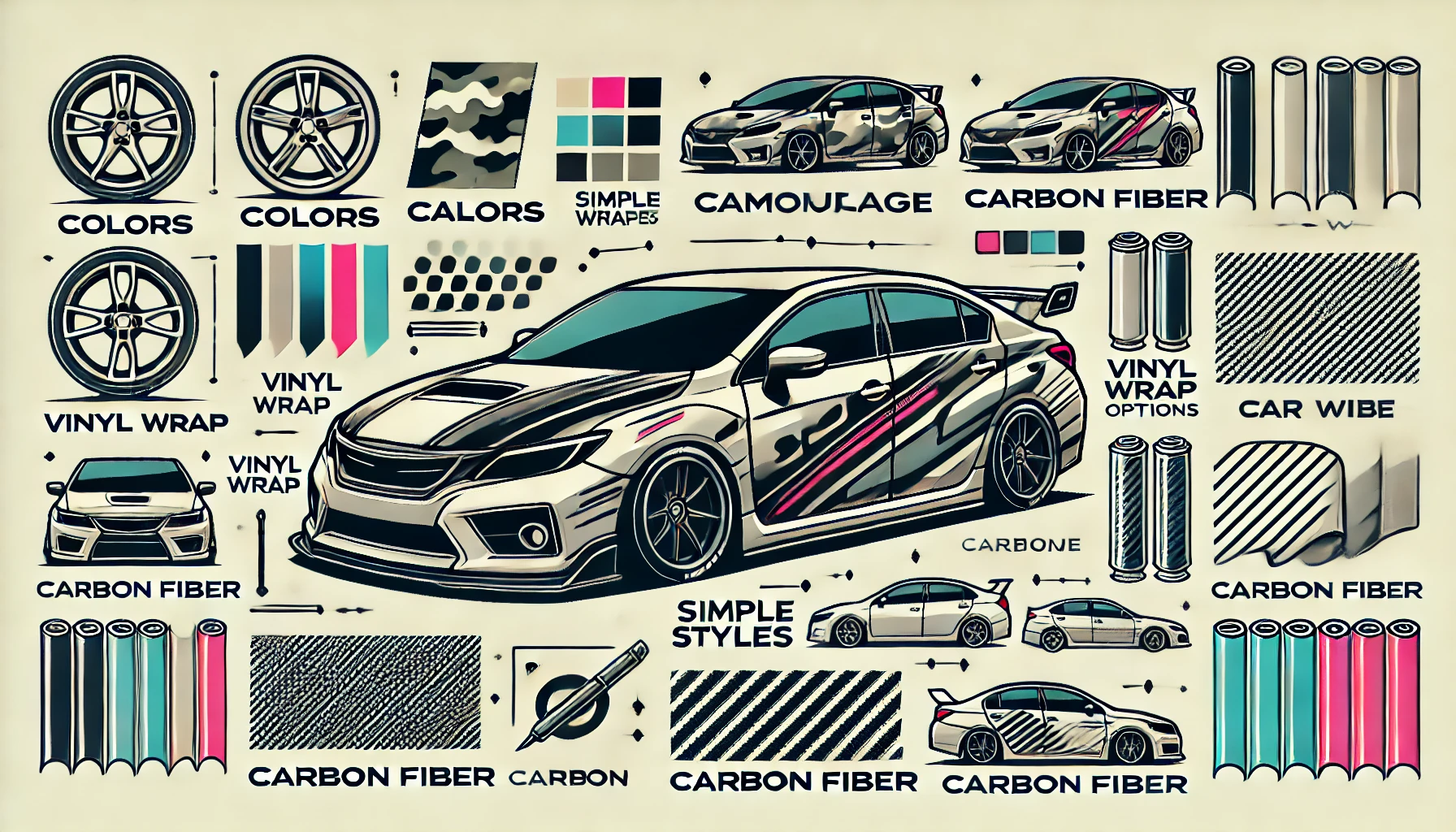
When it comes to customizing your car using vinyl wraps, there are countless options available based on your imagination. You can show your personality through your car by choosing different colors, patterns, or designs. From choosing traditional camouflage patterns to graphics, you’ve got plenty of options.
Car owners can also go for carbon fiber and unique finishes based on their tastes. If you want a more personalized look, you can get wraps with custom designs and decals.
Debunking Common Myths About Vinyl Wraps
Let’s debunk some common myths about vinyl wraps:
- It is often presumed that vinyl wraps damage the vehicle’s paint. In reality, these wraps act as a shield for your car’s exterior and can be installed and removed without damaging the underlying paint if you do it carefully.
- People think it is difficult to remove car wraps. In reality, anyone with the right expertise and suitable tools can remove the car wrap properly.
- It is considered that vinyl wraps are only for car enthusiasts. They can be used for business purposes as well.
DIY Vinyl Wrapping: Tips for Success
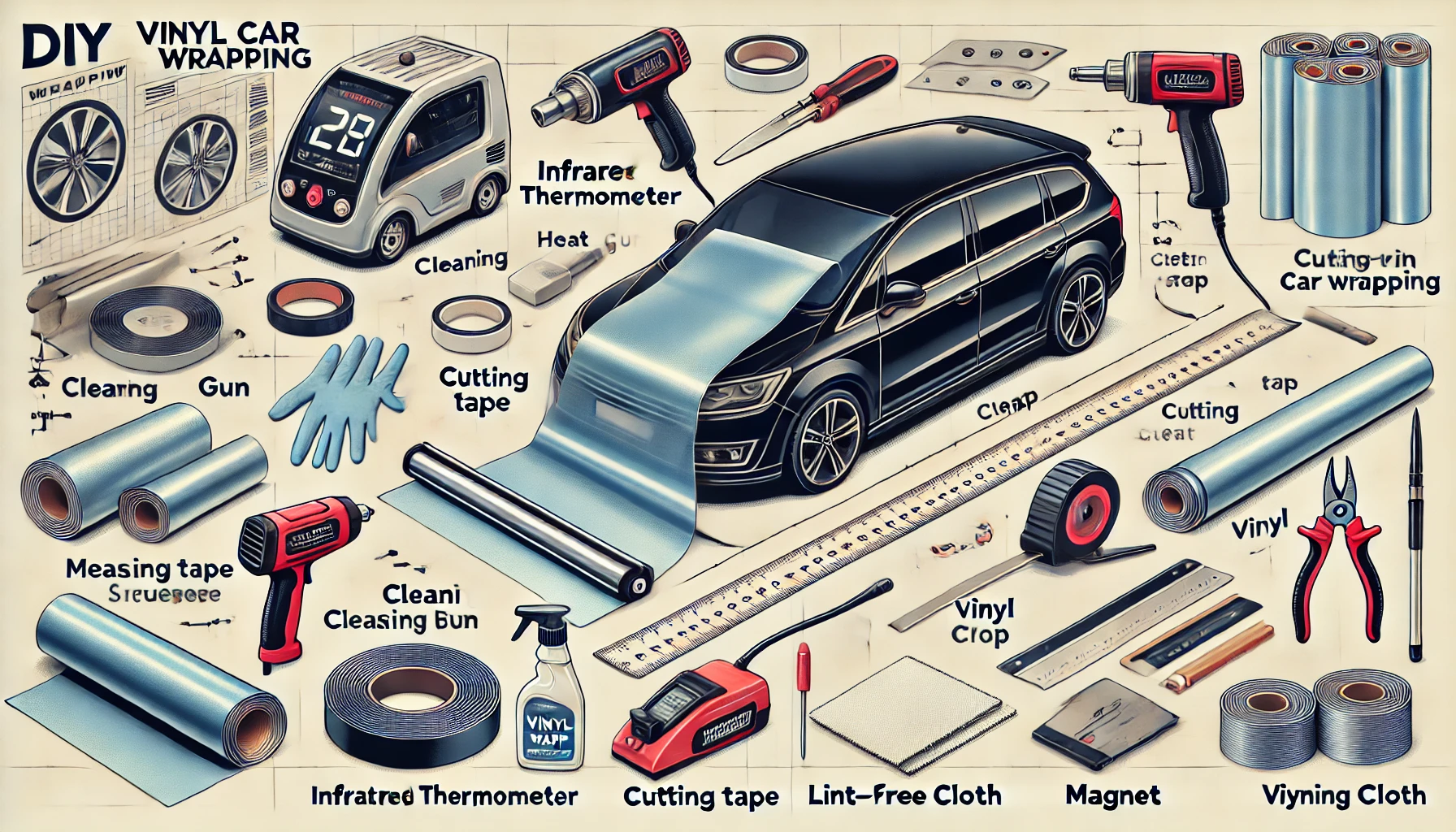
The following guide mentions how you can install a vinyl wrap yourself successfully:
Tools Needed for Application:
Get the following tools ready for DIYing vinyl wrapping your car:
- Heat gun
- Infrared thermometer
- Squeegee
- Cutting tape or masking tape
- Measuring tape
- Cutting blades
- Cotton gloves
- Cleaning solutions (a gentle cleaner and 70% to 90% isopropyl alcohol)
- Lint-free cloth
- Magnet
- A high-quality vinyl wrap
A Step-by-Step Guide for Wrapping a Car on a Budget
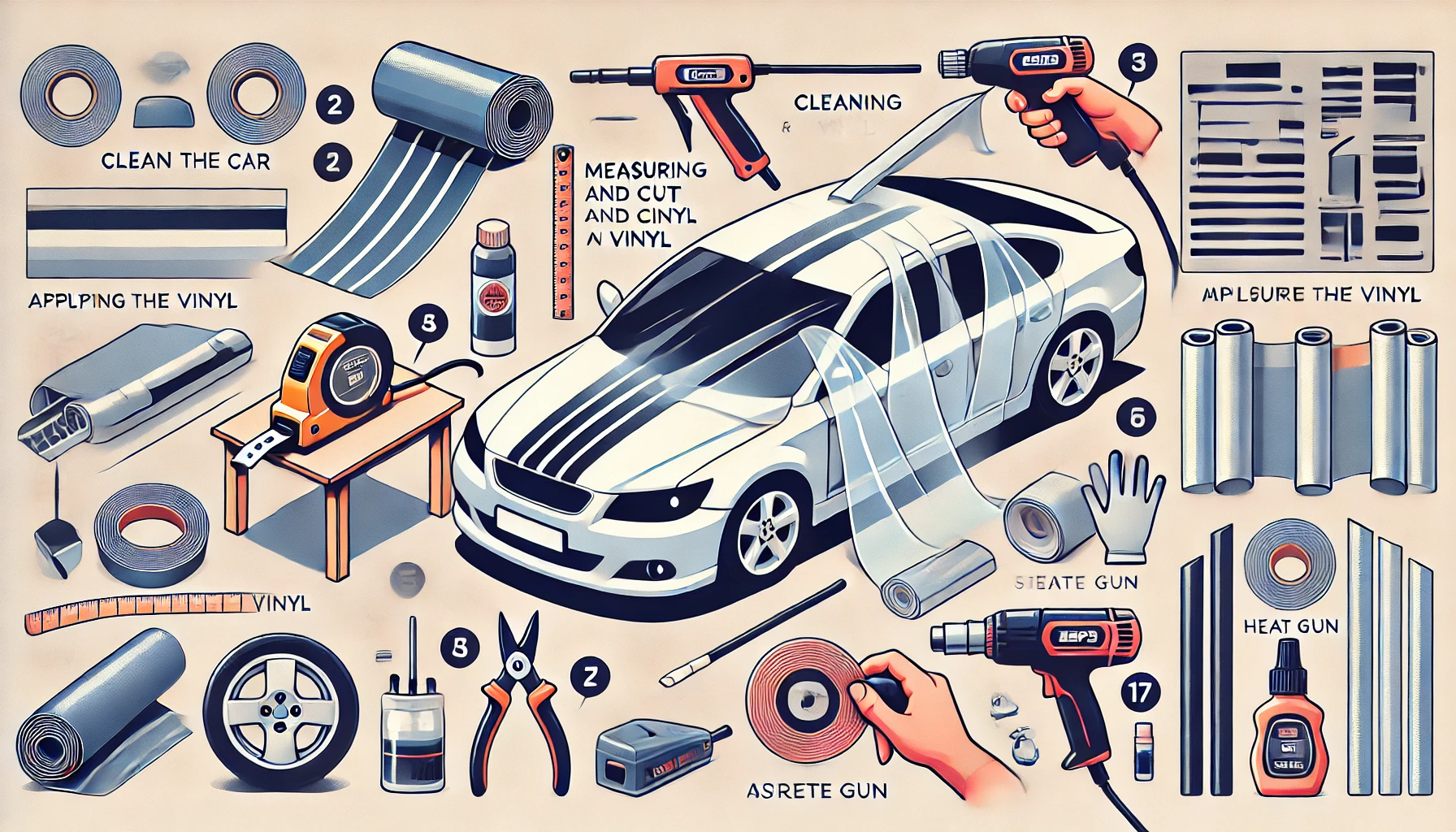
- Clean the surface of your car using the cleaning solutions using a lint-free cloth. Make sure it is free from dirt, wax, or rust. Minor imperfections, such as scratches will not cause a problem, but dents and rust could make those areas visible when the wrap is adhered to them.
- Measure each section of your car’s exterior using a measuring tape and add some extra inches for handling to avoid coming up short. Draw a diagram of the sections and write down the measurements on them.
- Start with cutting sections of vinyl wraps for smaller areas of the car, especially if you are handling them for the first time.
- Wear cotton gloves while handling the wraps to protect yourself from potentially hazardous materials.
- Carefully take off the back paper and place the wrap on the section of your car. You can cut out the extra hangings later.

- For curved surfaces like mirrors, apply heat for a wrinkle-free application, using a heat gun at a temperature of no more than 180 °F or 82 °C. Use a squeegee to even out the surface and properly adhere to the film.
- Cut out the excessive material using a cutter.
- Use a heat gun to heat the edges of the wrap at around 212 °F. This will activate the adhesive material. Use a thermometer to ensure you’re using the correct temperature.
- Again, use the heat gun on the rest of the area to activate the adhesive.
- Bubbles may appear initially but you can gently pop them with a pin.
- If you are wrapping your car without any help, use wrap magnets to hold the wrap in place. Magnets also ensure the film is aligned properly.
By following these DIY car wrapping tips, you can get a successful experience.
Common Mistakes to Avoid

- Avoid leaving wax or dirt on the surface as they can cause bubbles and peeling of the wrap.
- Using too much heat can distort the color while using less heat can decrease the adhesive properties of the vinyl film. So, use the right temperature.
- Vinyl films are flexible but overstretching them can cause their discoloration and thinning.
- Avoid wrapping your car in colder temperatures as vinyl loses its flexibility and does not adhere well.
- Do not leave space for the air bubbles by slowly evening out the surface.
- Make sure you do not leave wrinkles while installing the vinyl film.

Tips for a Successful Vinyl Wrap Experience
To get a successful vinyl wrap experience, we have some tips to offer.
- Explore various brands offering vinyl wraps. Choose a wrap that best suits your budget and requirements.
- If you have no prior experience in car wrapping, we suggest considering professional installation for a flawless finish and long-lasting results.
- To maximize the lifespan of the vinyl wraps, grasp the essential tips of cleaning and caring for your wrapped car. Avoid pressure-washing your car and use recommended cleaning products only.

FAQs
Q1. How long do vinyl wraps last?
Generally, vinyl wraps last for 3 to 5 years but if you maintain them properly, they can last for up to 7 years.
Q2. Is it cheaper to paint or wrap a car?
Painting a car can be an expensive option as it requires more preparation and techniques. Wrapping a car is cost-effective compared to painting it.
Q3. Do wraps damage a car’s paint?
No, car wraps do not damage a car’s paint if you carefully install and remove them.
Conclusion
Selecting vinyl wrapping should consider types, brands, and costs. This guide explains how wraps differ from paint, explores wrap types, including budget options, and details selection factors like the vehicle’s size and wraps’ finishes. It debunks common myths while revealing limitless customization potential, concluding with professional DIY tips to ensure a successful installation for your car wraps.
Why 1000+ Shops Trust CarLike® Vinyl Wraps? Get Your Custom Business Quote in 5 Minutes!
Launch Your Vinyl Business with CARLIKE® – China’s Leading Manufacturer Since 2008!
We produce 50,000+ premium rolls monthly. From premium paint protection films to car vinyl wraps, you can get a range of products from one place.
Planning to start a vinyl wrapping business? Get free expert guidance to find the right films for your budget today!
